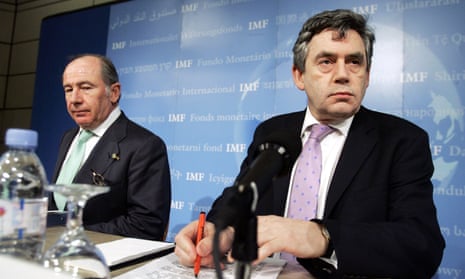Cast your mind back 10 years. It is April 2006 and finance ministers from around the world are gathering in Washington for the spring meeting of the International Monetary Fund. Gordon Brown is Britain’s chancellor of the exchequer. Alan Greenspan has just retired as the chairman of the Federal Reserve and is considered to be the greatest central banker who ever lived. The blossom is out and the mood is upbeat. The global economy is having its fastest burst of prolonged growth since the early 1970s.
A lot has changed since. The venue is the same. The occasion is the same. But the atmosphere is completely different. Back in 2006, the IMF saw no reason why the boom could not go on for ever. Its flagship half-yearly World Economic Outlook expected activity to keep humming along. It saw no sub-prime crisis, no collapse of Lehman Brothers, no Great Recession.
Unbridled optimism has now been replaced by deep pessimism. The IMF has started to buy into the theory – espoused by Larry Summers, the former US treasury secretary, and others – that the world is sinking into secular stagnation. That’s a state of affairs where demand is not robust enough prompting permanently low growth and deflation.
A real, if unspoken fear, is of a return to the inward-looking and nationalistic policies that marked the 1930s. Maurice Obstfeld, the Fund’s economic counsellor, said stagnant pay and rising inequality had created a sense that the rewards from economic growth were being creamed off by “mobile elites and owners of capital”, leaving too many others behind.
Is the Fund being too gloomy? Some might think so and could rightly point to the organisation’s less than stellar forecasting record. The IMF tends to go with the flow: it is late to spot both downturns and recoveries.
That said, the Fund’s analysis has the ring of truth about it. By historic standards, global growth of just over 3% this year would be extremely modest, especially given that interest rates have been so low for so long. Rising inequality has been a factor in this underwhelming performance: households are not enjoying strong growth in wages and are reluctant to load up on debt, as they did in the bubble years.
Anger is manifesting itself in a number of ways. It has surfaced in the US presidential race. It is apparent in Europe where, as Obstfeld notes, “the political consensus that once propelled the European project is fraying”. And it is the reason the UK will be holding a referendum on EU membership on 23 June.
The prospect of Brexit clearly scares the IMF. A vote to leave would, it says, have serious consequences not just for Britain and its EU partners but for the whole of the global economy. The Fund is twitchy. It can identify a number of different triggers that might possibly bring about a new, dangerous phase of the crisis – such as a sharper than expected slowdown in China, a collapse in emerging markets or a pandemic. But with little more than two months to go before the referendum, Brexit is the most immediate threat.
But if the Fund is right in its assessment, something will trigger the crisis sooner or later even if Britain decides to remain an EU member. The IMF says global growth has been too slow for too long, and proposes a mix of expansionary monetary policy (low interest rates and quantitative easing), higher spending on infrastructure and research and development, and structural reforms to boost productivity.
This, though, seems a bit timid if the Fund is right in its analysis that globalisation benefits the few not the many and that a rising tide no longer lifts all boats. In that case, the remedy would not be more R&D spending but checks on financial speculation and more aggressive redistribution. Global growth has indeed been too slow for too long. The Fund’s remedy is too little too late.

Comments (…)
Sign in or create your Guardian account to join the discussion